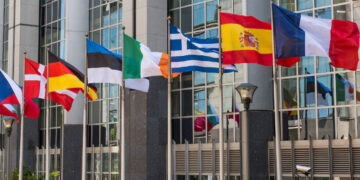On Saturday morning, negotiators from the European Parliament and the Council reached a provisional agreement on the 2025 EU Budget, before the deadline of the conciliation period.
Negotiators found solution to cover repayment costs for the European Recovery Instrument (EURI)
MEPs ensured that the financing of the EURI repayment costs, which are twice the amount initially forecast for 2025, could be achieved while at the same time protecting funding for essential programmes, like Erasmus+ or R&D. MEPs reversed all cuts made by member states and successfully insisted on the proper use of the new “EURI cascade mechanism” introduced in the revision of the EU’s long-term budget. This mechanism is designed to manage escalating Next Generation EU borrowing costs without affecting key initiatives, maintaining the budget’s flexibility and response capacity.
Parliament secured additional funding for EU programmes
In February, during the revision in the EU’s long-term budget, Parliament secured substantial increases to flagship programmes. Building on that, MEPs defended those additions and obtained further funding for essential policies in the 2025 annual budget.
Parliament successfully negotiated an additional €230.7 million in funding beyond the Commission’s initial draft proposal, focusing on programmes and policies aimed at improving people’s lives, boosting competitiveness, and addressing current challenges. On top of it, major increases stemming from previous savings will benefit the 2025 budget, including €62 million for Erasmus+ and €20 million for Horizon Europe. Key increases include:
Competitiveness, social policies and environment:
Migration, border management, and the world:
There were also additional staff and funds secured for the European Public Prosecutor’s Office (EPPO) and Europol.
The preliminary figures are €199,44 billion in commitment appropriations and €155,21 billion in payment appropriations. Detailed figures will be available in due course.
Providing help for regions effected by climate disasters
As part of next year’s budget, negotiators agreed to frontload payment appropriations of up to €3 billion to provide support for regions affected by natural disasters, including the recent floods. Once the legal base is confirmed, member states would be able to use up to 10% of existing Cohesion Policy funds to prevent and recover from such disasters, provided they submit an amended programme to the Commission.
Quotes
Johan Van Overtveldt (ECR, BE), Chair of the Committee on Budgets, said: “The agreement on the 2025 budget demonstrates the EU’s ability to act and adapt during these uncertain times. It builds on the mid-term revision of the expenditure ceilings in the multiannual financial framework and addresses the ongoing challenges we face: Russia’s war of aggression against Ukraine, persistent migratory pressures, the crisis in the Middle East, various natural disasters, and the pressures on the competitiveness of our economies. The EU budget is only a part of the whole task that lies ahead of us. Simplifying procedures, increasing flexibility and cutting the administrative burden are in my view as important as spending money to mobilise the innovative power of our citizens and companies.”
Victor Negrescu (S&D, RO), general rapporteur for the EU budget 2025 (for section III – Commission), said: “The Parliament has reached a strong agreement on the EU budget 2025 of almost €200 billion, which represents 6% more than the previous year. After several days of negotiations, I am glad we achieved increases on education, health, civil protection, research, border protection, agriculture, fighting against corruption, Schengen enlargement, social policies and humanitarian aid. We also managed to secure the €6 billion from cohesion funds much needed for the countries in Central and Eastern Europe affected by the floods. We managed to achieve all of that while finding a balanced approach in financing the debts generated by the Recovery and Resilience Facility. We have showed that, at European level, we are capable in coming up with common and clear solutions to EU challenges and citizens expectations.”
Niclas Herbst (EPP, DE), rapporteur for the other sections, said: “After tough negotiations, we have now reached an agreement on crucial issues for Parliament, such as cybersecurity. Parliament succeeded in ensuring that EU institutions will be adequately equipped with cybersecurity staff. We fulfilled the security needs of the delegations of the EU’s External Action Service (EEAS). Additionally, the Parliament has managed to strengthen the European Data Protection Supervisor’s (EDPS) capacity to supervise the use of AI in the 75 institutions and entities they are responsible for.”
Next steps
Once the Council formally adopts the compromise, a vote is expected in the Parliament’s plenary session (planned for 27 November in Strasbourg), then it is signed into law by the President.
Background
Well over 90% of the EU budget funds activities in EU countries and beyond, benefiting citizens, regions, farmers, researchers, students, NGOs, and businesses. Unlike national budgets, the EU budget is primarily aimed at investment, to generate growth and opportunities across the European Union. The EU serves 27 countries with a total population of 450 million. Given this scope, the annual EU budget is relatively small – on average €160-180 billion annually in 2021-27. This is comparable to the national budget of Denmark, which serves 5.6 million people, and is about 30% smaller than the budget of Poland, which serves 38 million. (Source: Commission)











































Discussion about this post